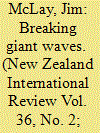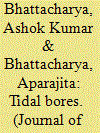| Srl | Item |
| 1 |
ID:
103090


|
|
|
| 2 |
ID:
144919


|
|
|
|
|
| Summary/Abstract |
David Rapoport's concept of Four Waves of terrorism, from Anarchist terrorism in the 1880s, through Nationalist and Marxist waves in the early and mid-twentieth century, to the present Religious Wave, is one of the most influential concepts in terrorism studies. However, this article argues that thinking about different types of terrorism as strains rather than waves better reflects both the empirical reality and the idea that terrorists learn from and emulate each other. Whereas the notion of waves suggests distinct iterations of terrorist violence driven by successive broad historical trends, the concept of strains and contagion emphasizes how terrorist groups draw on both contemporary and historical lessons in the development of their tactics, strategies, and goals. The authors identify four distinct strains in total—Socialist, Nationalist, Religious, and Exclusionist—and contend that it is possible to trace each strain back to a “patient zero” active in the 1850s.
|
|
|
|
|
|
|
|
|
|
|
|
|
|
|
|
| 3 |
ID:
124288


|
|
|
|
|
| Publication |
2013.
|
| Summary/Abstract |
A tidal bore is a spectacular tidal phenomenon in which the leading edge of the incoming tide forms of wave (or number of waves) that travels up a river or narrow bay against the direction of the river or bay's current it is a passive surge of tidal origin that forms when a rising tide enters a shallow, gently sloping and narrowing river from a board funnel mouthed estuary.
|
|
|
|
|
|
|
|
|
|
|
|
|
|
|
|